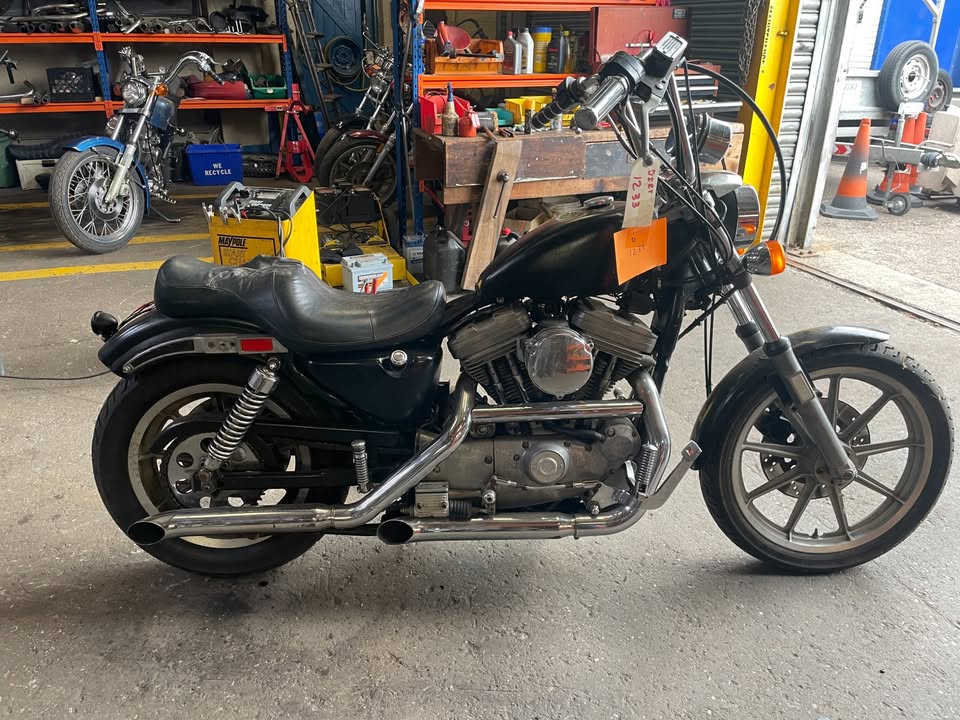Classic and Classy Motorcycles Ltd
Vintage and Classic Motorcycle Importers
1987 Harley Davidson XL883HUG Sportster Project Ref D1233

1987 Harley-Davidson XL883HUG Sportster Hugger – Low Stance, Classic Evolution Power
Historical Context
The 1987 Harley-Davidson XL883HUG Sportster Hugger was one of the first factory-built Sportsters designed with shorter riders in mind. Introduced in the mid-1980s, the Hugger featured a lowered suspension, narrower seat, and reduced overall height. It retained the same Evolution engine and core components as the standard XL883 but came with a more compact stance that improved confidence at stoplights and low-speed manoeuvres. As Harley-Davidson worked to broaden its appeal during the post-AMF rebuild, the Hugger played a role in attracting new riders to the brand—especially those looking for classic Harley sound and style in a more manageable package.
Technical Specifications and Performance
• Year: 1987
• Make: Harley-Davidson
• Model: XL883HUG Sportster Hugger
• Engine Displacement: 883cc
• Engine Type: Air-cooled Evolution V-twin
• Compression Ratio: 9.0:1
• Carburetion: Keihin carburetor
• Ignition System: Electronic
• Transmission Type: 4-speed manual
• Final Drive: Belt
• Cooling System: Air-cooled
• Fuel Capacity: Approx. 3.3 gallons
• Braking System: Disc front and rear
• Dry Weight: Approx. 485 lbs
• Top Speed: Around 95–100 mph
Technical Advancements
The 1987 XL883HUG featured Harley’s newly refined Evolution engine, introduced in the Sportster range in 1986. This motor was far more reliable than the old Ironhead, offering improved oil control, less vibration, and easier maintenance. The Hugger package brought a shortened front fork, low-profile rear shocks, and a narrower solo seat, which collectively lowered the seat height and centre of gravity. It maintained the raw charm of the standard Sportster but was easier to ride for shorter or less experienced riders.
Evolution of the Model
The Hugger was among the first Sportsters tailored specifically for accessibility, and it paved the way for later low-slung models like the Iron 883 and SuperLow. While retaining the classic Sportster tank, fenders, and lines, the Hugger distinguished itself with its compact stance and manageable ergonomics. It still packed the same torque-rich Evolution engine and remained a favourite among those who wanted a real Harley experience without the size and weight of the big twins. It remained in the lineup for several years before being replaced by newer “Low” variants in the 2000s.
Competitors in the Market
In 1987, the Hugger faced competition from lightweight cruisers like the Honda Shadow VT500C, Yamaha Virago 535, and Suzuki Savage 650. These Japanese cruisers were reliable and easy to ride, but the Harley offered more presence and a deeper sense of heritage. The belt drive and Evolution engine also gave it real mechanical credibility. While the imports were often more refined, they couldn’t match the customization potential and brand loyalty associated with Harley-Davidson.
Legacy and Appeal
As a barn find or restoration project, the 1987 XL883HUG is a solid platform. Its Evolution engine is tough, the design is timeless, and the lowered chassis makes it a great choice for riders of smaller stature or those seeking a nimble, low-slung custom build. With strong parts support and a dedicated following, the Hugger holds its own as a practical, approachable way into Harley ownership—delivering real V-twin character in a compact, confident package.
Find Classic Motorcycles
Stay in the loop - Subscribe for Updates
One email notification a month when a new shipment arrives.